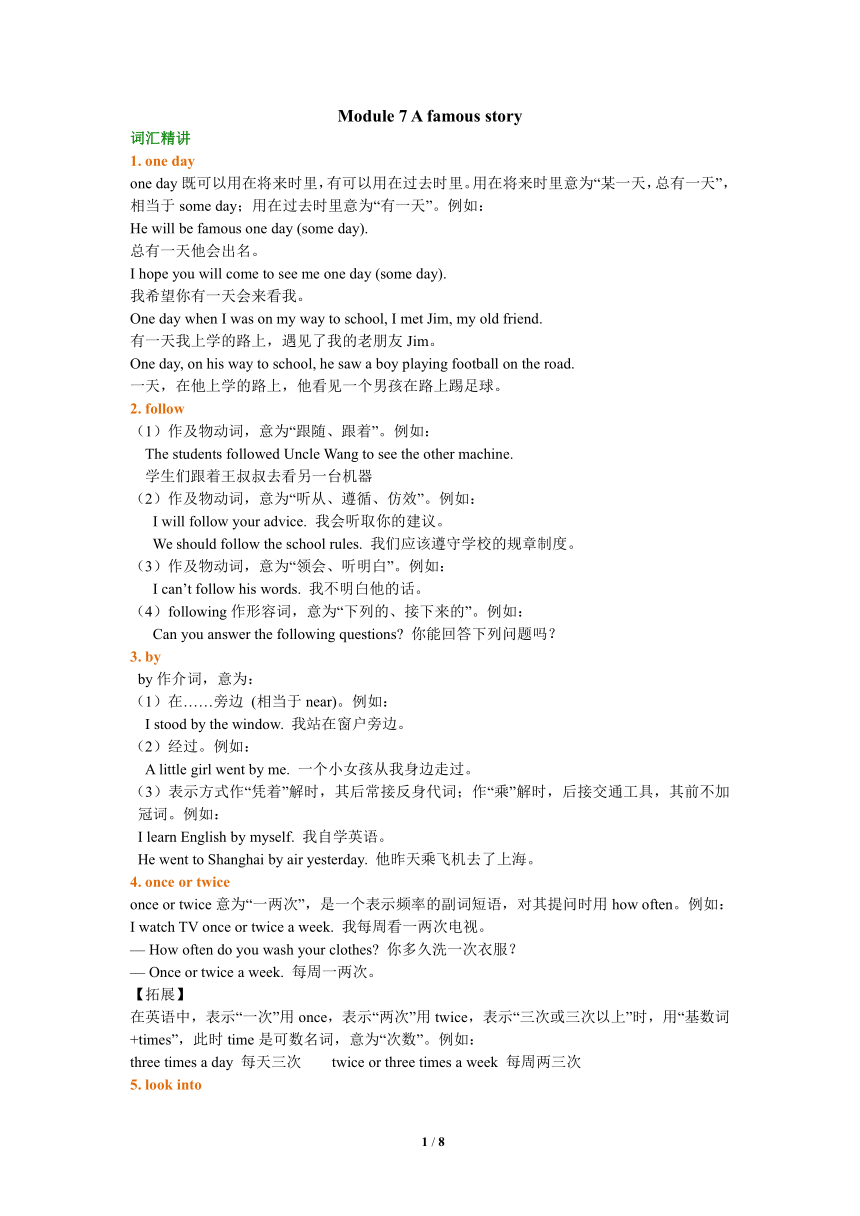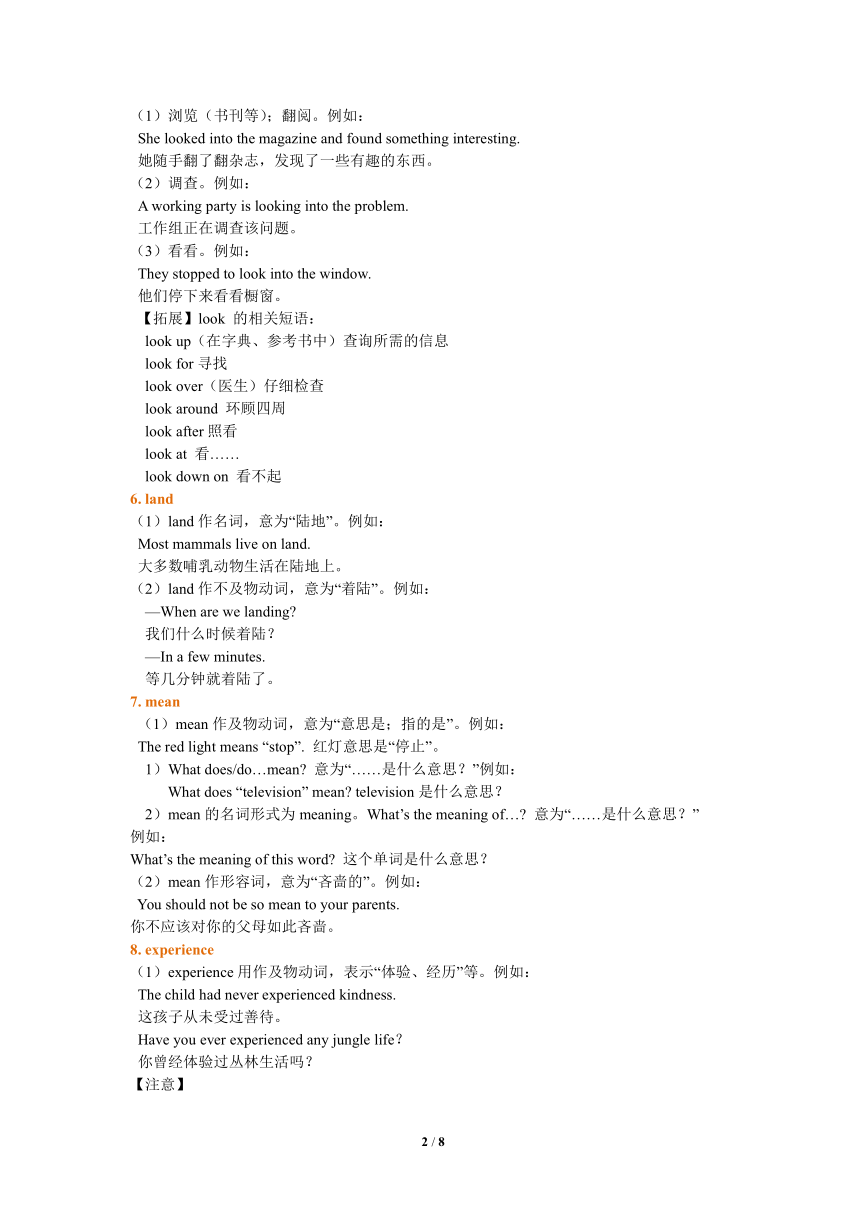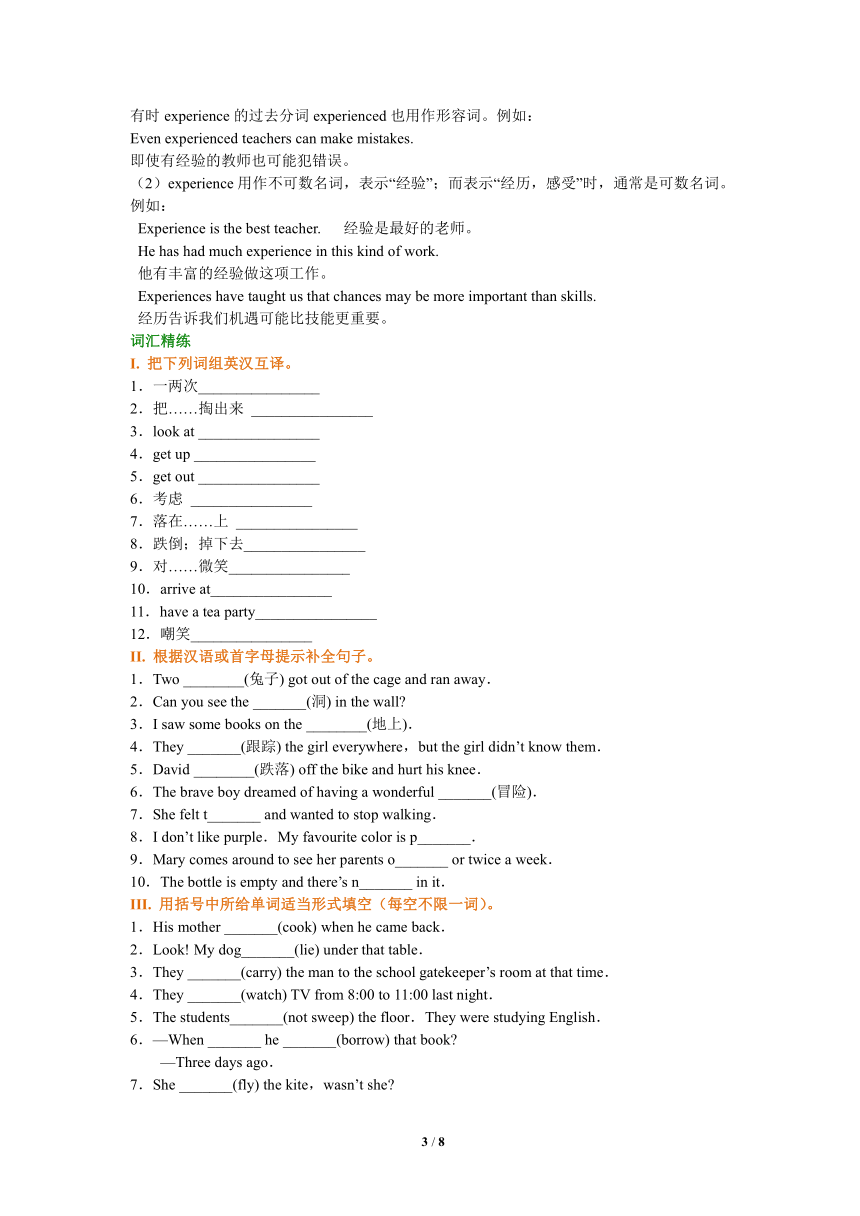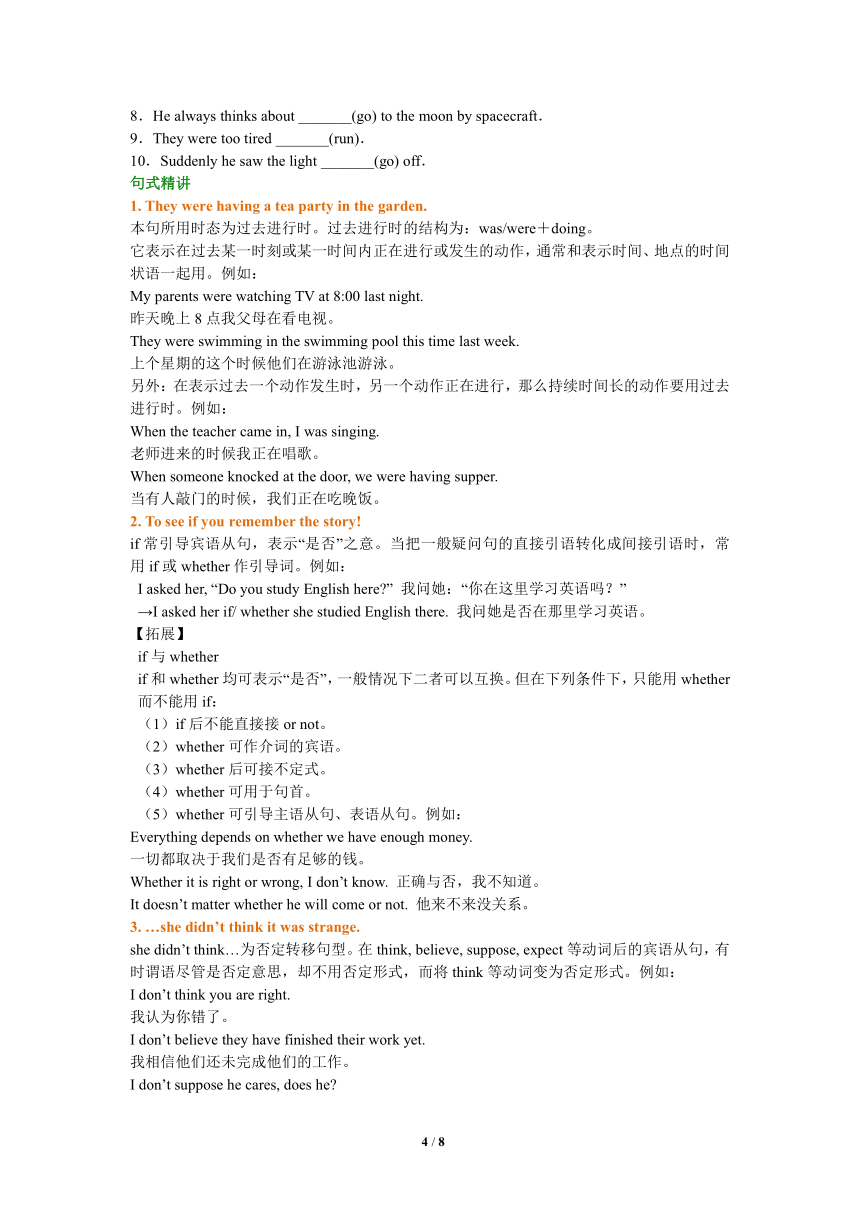Module 7 A famous story词句精讲精练
文档属性
| 名称 | Module 7 A famous story词句精讲精练 |  | |
| 格式 | doc | ||
| 文件大小 | 62.5KB | ||
| 资源类型 | 教案 | ||
| 版本资源 | 外研版 | ||
| 科目 | 英语 | ||
| 更新时间 | 2022-06-24 20:01:44 | ||
图片预览




文档简介
Module 7 A famous story
词汇精讲
1. one day
one day既可以用在将来时里,有可以用在过去时里。用在将来时里意为“某一天,总有一天”,相当于some day;用在过去时里意为“有一天”。例如:
He will be famous one day (some day).
总有一天他会出名。
I hope you will come to see me one day (some day).
我希望你有一天会来看我。
One day when I was on my way to school, I met Jim, my old friend.
有一天我上学的路上,遇见了我的老朋友Jim。
One day, on his way to school, he saw a boy playing football on the road.
一天,在他上学的路上,他看见一个男孩在路上踢足球。
2. follow
(1)作及物动词,意为“跟随、跟着”。例如:
The students followed Uncle Wang to see the other machine.
学生们跟着王叔叔去看另一台机器
(2)作及物动词,意为“听从、遵循、仿效”。例如:
I will follow your advice. 我会听取你的建议。
We should follow the school rules. 我们应该遵守学校的规章制度。
(3)作及物动词,意为“领会、听明白”。例如:
I can’t follow his words. 我不明白他的话。
(4)following作形容词,意为“下列的、接下来的”。例如:
Can you answer the following questions 你能回答下列问题吗?
3. by
by作介词,意为:
(1)在……旁边 (相当于near)。例如:
I stood by the window. 我站在窗户旁边。
(2)经过。例如:
A little girl went by me. 一个小女孩从我身边走过。
(3)表示方式作“凭着”解时,其后常接反身代词;作“乘”解时,后接交通工具,其前不加冠词。例如:
I learn English by myself. 我自学英语。
He went to Shanghai by air yesterday. 他昨天乘飞机去了上海。
4. once or twice
once or twice意为“一两次”,是一个表示频率的副词短语,对其提问时用how often。例如:
I watch TV once or twice a week. 我每周看一两次电视。
— How often do you wash your clothes 你多久洗一次衣服?
— Once or twice a week. 每周一两次。
【拓展】
在英语中,表示“一次”用once,表示“两次”用twice,表示“三次或三次以上”时,用“基数词+times”,此时time是可数名词,意为“次数”。例如:
three times a day 每天三次 twice or three times a week 每周两三次
5. look into
(1)浏览(书刊等);翻阅。例如:
She looked into the magazine and found something interesting.
她随手翻了翻杂志,发现了一些有趣的东西。
(2)调查。例如:
A working party is looking into the problem.
工作组正在调查该问题。
(3)看看。例如:
They stopped to look into the window.
他们停下来看看橱窗。
【拓展】look 的相关短语:
look up(在字典、参考书中)查询所需的信息
look for寻找
look over(医生)仔细检查
look around 环顾四周
look after照看
look at 看……
look down on 看不起
6. land
(1)land作名词,意为“陆地”。例如:
Most mammals live on land.
大多数哺乳动物生活在陆地上。
(2)land作不及物动词,意为“着陆”。例如:
—When are we landing
我们什么时候着陆?
—In a few minutes.
等几分钟就着陆了。
7. mean
(1)mean作及物动词,意为“意思是;指的是”。例如:
The red light means “stop”. 红灯意思是“停止”。
1)What does/do…mean 意为“……是什么意思?”例如:
What does “television” mean television是什么意思?
2)mean的名词形式为meaning。What’s the meaning of… 意为“……是什么意思?”
例如:
What’s the meaning of this word 这个单词是什么意思?
(2)mean作形容词,意为“吝啬的”。例如:
You should not be so mean to your parents.
你不应该对你的父母如此吝啬。
8. experience
(1)experience用作及物动词,表示“体验、经历”等。例如:
The child had never experienced kindness.
这孩子从未受过善待。
Have you ever experienced any jungle life?
你曾经体验过丛林生活吗?
【注意】
有时experience的过去分词experienced也用作形容词。例如:
Even experienced teachers can make mistakes.
即使有经验的教师也可能犯错误。
(2)experience用作不可数名词,表示“经验”;而表示“经历,感受”时,通常是可数名词。例如:
Experience is the best teacher. 经验是最好的老师。
He has had much experience in this kind of work.
他有丰富的经验做这项工作。
Experiences have taught us that chances may be more important than skills.
经历告诉我们机遇可能比技能更重要。
词汇精练
I. 把下列词组英汉互译。
1.一两次________________
2.把……掏出来 ________________
3.look at ________________
4.get up ________________
5.get out ________________
6.考虑 ________________
7.落在……上 ________________
8.跌倒;掉下去________________
9.对……微笑________________
10.arrive at________________
11.have a tea party________________
12.嘲笑________________
II. 根据汉语或首字母提示补全句子。
1.Two ________(兔子) got out of the cage and ran away.
2.Can you see the _______(洞) in the wall
3.I saw some books on the ________(地上).
4.They _______(跟踪) the girl everywhere,but the girl didn’t know them.
5.David ________(跌落) off the bike and hurt his knee.
6.The brave boy dreamed of having a wonderful _______(冒险).
7.She felt t_______ and wanted to stop walking.
8.I don’t like purple.My favourite color is p_______.
9.Mary comes around to see her parents o_______ or twice a week.
10.The bottle is empty and there’s n_______ in it.
III. 用括号中所给单词适当形式填空(每空不限一词)。
1.His mother _______(cook) when he came back.
2.Look! My dog_______(lie) under that table.
3.They _______(carry) the man to the school gatekeeper’s room at that time.
4.They _______(watch) TV from 8:00 to 11:00 last night.
5.The students_______(not sweep) the floor.They were studying English.
6.—When _______ he _______(borrow) that book
—Three days ago.
7.She _______(fly) the kite,wasn’t she
8.He always thinks about _______(go) to the moon by spacecraft.
9.They were too tired _______(run).
10.Suddenly he saw the light _______(go) off.
句式精讲
1. They were having a tea party in the garden.
本句所用时态为过去进行时。过去进行时的结构为:was/were+doing。
它表示在过去某一时刻或某一时间内正在进行或发生的动作,通常和表示时间、地点的时间状语一起用。例如:
My parents were watching TV at 8:00 last night.
昨天晚上8点我父母在看电视。
They were swimming in the swimming pool this time last week.
上个星期的这个时候他们在游泳池游泳。
另外:在表示过去一个动作发生时,另一个动作正在进行,那么持续时间长的动作要用过去进行时。例如:
When the teacher came in, I was singing.
老师进来的时候我正在唱歌。
When someone knocked at the door, we were having supper.
当有人敲门的时候,我们正在吃晚饭。
2. To see if you remember the story!
if常引导宾语从句,表示“是否”之意。当把一般疑问句的直接引语转化成间接引语时,常 用if或whether作引导词。例如:
I asked her, “Do you study English here ” 我问她:“你在这里学习英语吗?”
→I asked her if/ whether she studied English there. 我问她是否在那里学习英语。
【拓展】
if与whether
if和whether均可表示“是否”,一般情况下二者可以互换。但在下列条件下,只能用whether而不能用if:
(1)if后不能直接接or not。
(2)whether可作介词的宾语。
(3)whether后可接不定式。
(4)whether可用于句首。
(5)whether可引导主语从句、表语从句。例如:
Everything depends on whether we have enough money.
一切都取决于我们是否有足够的钱。
Whether it is right or wrong, I don’t know. 正确与否,我不知道。
It doesn’t matter whether he will come or not. 他来不来没关系。
3. …she didn’t think it was strange.
she didn’t think…为否定转移句型。在think, believe, suppose, expect等动词后的宾语从句,有时谓语尽管是否定意思,却不用否定形式,而将think等动词变为否定形式。例如:
I don’t think you are right.
我认为你错了。
I don’t believe they have finished their work yet.
我相信他们还未完成他们的工作。
I don’t suppose he cares, does he
我想他不在意,是吗?
【拓展】
…think后经常用it作形式宾语,即“… think it(形式宾语) + adj. + for sb. + 动词不定式”意
为“某人认为……如何”。例如:
Do you think it useful for us to read more books 你认为我们多读书有用吗?
4. And what is a book for…
what…for意为“有什么用,为什么”。是不理解对方动机或询问对方目的和用途时的用语,for位于句末,一般用动词不定式或for的介词短语回答。例如:
What did you hit him for 你为什么打他?
— What did you do that for 你为什么做那件事
— To finish the work early. 为了早完成这项工作。
— I’m going to Paris. 我要去巴黎。
— What for (= What are you going to Paris for ) 去做什么?
【拓展】
why也表示“为什么”,但重在询问原因,一般用because回答。例如:
(1)— Why do you like P.E. 你为什么喜欢体育?
— Because it’s interesting. 因为它有趣。
(2)— What do you like P.E. for 你为什么喜欢体育?
— To keep healthy. 为了保持健康。
5. It was too dark for her to see anything.
too…to…意为“太……而不能”。它在结构形式上是肯定的,但意义上却表示否定含义,所以动词不定式符号to前不能再加not,只接动词原形即可,too后接形容词或副词原形。
例如:
The book is too difficult to understand. 这本书难于理解。
【拓展】
(1)在too…to…句型中,当动词不定式的动词是不及物动词,其后所跟的介词不能省略。例如:
The room is too small to live in. 这房间太小了不能住。
(2)在too…to…句型中,当动词不定式的宾语实际上就是这个句子的主语时,动词不定式后面不能再加代词作宾语。例如:
The question is too difficult to answer. 这个问题太难了,无法回答。
(3)在too…to…句型中,当动词不定式能确切说明动作执行者时,可以在动词不定式前面加上逻辑主语,即for sb.形式。例如:
The box is too heavy for him to carry. 箱子太沉了,他搬不动。
(4)含too…to…的句子可以改写成so…that…句型,意为“如此……以至于……”。例如:
He is too old to do hard work.
= He is so old that he can’t do hard work. 他年纪太大而不能干重活。
(5)含too…to…的句子也可以用“not + 形容词/副词 + enough to do sth.”句型来替换,但注意要用原句中形容词或副词的反义词。例如:
He is too old to do hard work.
= He is not young enough to do hard work. 他年纪大了,不能做重活。
句式精练
I. 句型转换,按要求完成下列句子。
1.Be careful when you cross the street.(改为同义句)
Be careful when you _______ _______ the street.
2.They didn’t find anything in the room.(改为同义句)
They ______ ______ in the room.
3.What did the man do that for (改为同义句)
_______ did the man do that
4.He was watching TV at half past nine yesterday evening.(对划线部分提问)
_______ _______ _______ _______ at half past nine yesterday evening
5.The teacher asked me.Why did I arrive late for class (合并为复合句)
The teacher asked me _______ _______ _______ _______ for class.
II. 根据汉语提示,完成句子。
1.爱丽丝无事可做。
Alice had ________ ________ ________.
2.一本书有什么用?
________ is a book ________
3.关于那件事没有什么奇怪的。
There was ________ ________ about that.
4.她看到它进到了地里的一个巨大的兔子洞里
She ________ ________ ________ ________a large rabbit hole in the ground.
5.然后爱丽丝也跟着它下去了,从来没有考虑她打算怎样再出来。
The Alice went down after it, but never thought about ________ ________ ________ going to get out again.
6.对她来说太黑了,看不见任何东西。
It was too dark for her ________ ________ ________.
7.玛丽每星期去一两次图书馆。
Mary goes to the library ________ ________ ________ a week.
III.根据句意及所给单词完成句子。
1. 昨天中午你在做什么
What ____ you _____ (do) at noon yesterday
2. 昨天下午四点孩子们在踢足球。
The children ____________(play) football at four yesterday afternoon.
3. 在小学的时候他晚上通常看电视。
He usually _______ (watch) TV in the evening when he was in primary school.
4. 昨晚迈克进来的时候我在做作业。
I ___________ (do) my homework when Mike _____(come) last night.
5. 昨天我来看她的时候她正在打扫房间。
She ____________(clean) the room when I ______(go) to see her yesterday.
6. 那晚当我走进房间的时候他们正在看报纸。
They ____________ (read) the newspaper when I _______(go) into the room that evening.
7. 昨天,当我看见老师的时候,她正在和一些家长谈话。
The teacher _____________(talk) to some parents when I _____(see) her yesterday.
8. 上周五当布莱克老师进教室的时候,学生们正在复习功课。
The students __________(revise) for their lessons when Mr. Black ______(enter) the classroom last Friday.
IV. 补全对话。
A. Don’t you think it’s a little silly B. I’m reading a book called Yu Gong Moves a Mountain (愚公移山).C. That’s better and faster than moving a mountain.D. In my opinion, it’s really interesting.E. Do you prefer to read stories F. I still don’t agree with you.G. How about you
Emma: What are you doing, Li Lin
Li Lin: 1
Emma: I have read it before. What do you think of the story
Li Lin: 2 Yu Gong found a good way to deal with his problem.
Emma: Really 3 It seems impossible to move a mountain.
Li Lin: But the story is trying to show us that anything is possible if you work hard. Yu
Gong kept trying and didn’t give up.
Emma: 4 I think we should try to find other ways to deal with a problem.
Li Lin: But what could Yu Gong do except moving the mountains
Emma: He could build a road. 5
Li Lin: We have different opinions about the story. There’re many sides to a story and many ways
to understand it.
Emma: Yes, that’s fine.
【参考答案】
词汇精练
I. 把下列词组英汉互译。
1. once or twice 2. take…out of 3. 看 4. 起来;起床 5. 出去 6. think about 7. land on 8. fall down 9. smile at… 10. 到达 11. 举办一场茶话会 12. laugh at
II. 根据汉语或首字母提示完成下列句子。
1.rabbits 2.hole 3.ground 4.followed 5.fell 6.adventure
7.tired 8.pink 9.once 10.nothing
III. 用括号中所给单词适当形式填空(每空不限一词)。
1.was cooking
2.is lying
3.were carrying
4.were watching
5.weren’t sweeping
6.did;borrow
7.was flying
8.going
9.to run
10.go
句式精练
I. 句型转换,按要求完成下列句子。
1.go/walk across 2.found nothing 3.Why 4.What was he doing 5.Why I arrived late
II. 根据汉语提示,完成句子。
1. nothing to do 2. What;for 3. nothing strange 4. saw it go down 5. how she was
6. to see anything 7. once or twice
III.根据句意及所给单词完成句子。
1. were;doing
2. were playing
3. watched
4. was doing;came
5. was cleaning,went
6. were reading;went
7. was talking;saw
8. were revising;entered
IV. 从方框中找出各句对应的答语,其中有两项为多余选项。
1-5. BDAFC[中
PAGE
1 / 8
词汇精讲
1. one day
one day既可以用在将来时里,有可以用在过去时里。用在将来时里意为“某一天,总有一天”,相当于some day;用在过去时里意为“有一天”。例如:
He will be famous one day (some day).
总有一天他会出名。
I hope you will come to see me one day (some day).
我希望你有一天会来看我。
One day when I was on my way to school, I met Jim, my old friend.
有一天我上学的路上,遇见了我的老朋友Jim。
One day, on his way to school, he saw a boy playing football on the road.
一天,在他上学的路上,他看见一个男孩在路上踢足球。
2. follow
(1)作及物动词,意为“跟随、跟着”。例如:
The students followed Uncle Wang to see the other machine.
学生们跟着王叔叔去看另一台机器
(2)作及物动词,意为“听从、遵循、仿效”。例如:
I will follow your advice. 我会听取你的建议。
We should follow the school rules. 我们应该遵守学校的规章制度。
(3)作及物动词,意为“领会、听明白”。例如:
I can’t follow his words. 我不明白他的话。
(4)following作形容词,意为“下列的、接下来的”。例如:
Can you answer the following questions 你能回答下列问题吗?
3. by
by作介词,意为:
(1)在……旁边 (相当于near)。例如:
I stood by the window. 我站在窗户旁边。
(2)经过。例如:
A little girl went by me. 一个小女孩从我身边走过。
(3)表示方式作“凭着”解时,其后常接反身代词;作“乘”解时,后接交通工具,其前不加冠词。例如:
I learn English by myself. 我自学英语。
He went to Shanghai by air yesterday. 他昨天乘飞机去了上海。
4. once or twice
once or twice意为“一两次”,是一个表示频率的副词短语,对其提问时用how often。例如:
I watch TV once or twice a week. 我每周看一两次电视。
— How often do you wash your clothes 你多久洗一次衣服?
— Once or twice a week. 每周一两次。
【拓展】
在英语中,表示“一次”用once,表示“两次”用twice,表示“三次或三次以上”时,用“基数词+times”,此时time是可数名词,意为“次数”。例如:
three times a day 每天三次 twice or three times a week 每周两三次
5. look into
(1)浏览(书刊等);翻阅。例如:
She looked into the magazine and found something interesting.
她随手翻了翻杂志,发现了一些有趣的东西。
(2)调查。例如:
A working party is looking into the problem.
工作组正在调查该问题。
(3)看看。例如:
They stopped to look into the window.
他们停下来看看橱窗。
【拓展】look 的相关短语:
look up(在字典、参考书中)查询所需的信息
look for寻找
look over(医生)仔细检查
look around 环顾四周
look after照看
look at 看……
look down on 看不起
6. land
(1)land作名词,意为“陆地”。例如:
Most mammals live on land.
大多数哺乳动物生活在陆地上。
(2)land作不及物动词,意为“着陆”。例如:
—When are we landing
我们什么时候着陆?
—In a few minutes.
等几分钟就着陆了。
7. mean
(1)mean作及物动词,意为“意思是;指的是”。例如:
The red light means “stop”. 红灯意思是“停止”。
1)What does/do…mean 意为“……是什么意思?”例如:
What does “television” mean television是什么意思?
2)mean的名词形式为meaning。What’s the meaning of… 意为“……是什么意思?”
例如:
What’s the meaning of this word 这个单词是什么意思?
(2)mean作形容词,意为“吝啬的”。例如:
You should not be so mean to your parents.
你不应该对你的父母如此吝啬。
8. experience
(1)experience用作及物动词,表示“体验、经历”等。例如:
The child had never experienced kindness.
这孩子从未受过善待。
Have you ever experienced any jungle life?
你曾经体验过丛林生活吗?
【注意】
有时experience的过去分词experienced也用作形容词。例如:
Even experienced teachers can make mistakes.
即使有经验的教师也可能犯错误。
(2)experience用作不可数名词,表示“经验”;而表示“经历,感受”时,通常是可数名词。例如:
Experience is the best teacher. 经验是最好的老师。
He has had much experience in this kind of work.
他有丰富的经验做这项工作。
Experiences have taught us that chances may be more important than skills.
经历告诉我们机遇可能比技能更重要。
词汇精练
I. 把下列词组英汉互译。
1.一两次________________
2.把……掏出来 ________________
3.look at ________________
4.get up ________________
5.get out ________________
6.考虑 ________________
7.落在……上 ________________
8.跌倒;掉下去________________
9.对……微笑________________
10.arrive at________________
11.have a tea party________________
12.嘲笑________________
II. 根据汉语或首字母提示补全句子。
1.Two ________(兔子) got out of the cage and ran away.
2.Can you see the _______(洞) in the wall
3.I saw some books on the ________(地上).
4.They _______(跟踪) the girl everywhere,but the girl didn’t know them.
5.David ________(跌落) off the bike and hurt his knee.
6.The brave boy dreamed of having a wonderful _______(冒险).
7.She felt t_______ and wanted to stop walking.
8.I don’t like purple.My favourite color is p_______.
9.Mary comes around to see her parents o_______ or twice a week.
10.The bottle is empty and there’s n_______ in it.
III. 用括号中所给单词适当形式填空(每空不限一词)。
1.His mother _______(cook) when he came back.
2.Look! My dog_______(lie) under that table.
3.They _______(carry) the man to the school gatekeeper’s room at that time.
4.They _______(watch) TV from 8:00 to 11:00 last night.
5.The students_______(not sweep) the floor.They were studying English.
6.—When _______ he _______(borrow) that book
—Three days ago.
7.She _______(fly) the kite,wasn’t she
8.He always thinks about _______(go) to the moon by spacecraft.
9.They were too tired _______(run).
10.Suddenly he saw the light _______(go) off.
句式精讲
1. They were having a tea party in the garden.
本句所用时态为过去进行时。过去进行时的结构为:was/were+doing。
它表示在过去某一时刻或某一时间内正在进行或发生的动作,通常和表示时间、地点的时间状语一起用。例如:
My parents were watching TV at 8:00 last night.
昨天晚上8点我父母在看电视。
They were swimming in the swimming pool this time last week.
上个星期的这个时候他们在游泳池游泳。
另外:在表示过去一个动作发生时,另一个动作正在进行,那么持续时间长的动作要用过去进行时。例如:
When the teacher came in, I was singing.
老师进来的时候我正在唱歌。
When someone knocked at the door, we were having supper.
当有人敲门的时候,我们正在吃晚饭。
2. To see if you remember the story!
if常引导宾语从句,表示“是否”之意。当把一般疑问句的直接引语转化成间接引语时,常 用if或whether作引导词。例如:
I asked her, “Do you study English here ” 我问她:“你在这里学习英语吗?”
→I asked her if/ whether she studied English there. 我问她是否在那里学习英语。
【拓展】
if与whether
if和whether均可表示“是否”,一般情况下二者可以互换。但在下列条件下,只能用whether而不能用if:
(1)if后不能直接接or not。
(2)whether可作介词的宾语。
(3)whether后可接不定式。
(4)whether可用于句首。
(5)whether可引导主语从句、表语从句。例如:
Everything depends on whether we have enough money.
一切都取决于我们是否有足够的钱。
Whether it is right or wrong, I don’t know. 正确与否,我不知道。
It doesn’t matter whether he will come or not. 他来不来没关系。
3. …she didn’t think it was strange.
she didn’t think…为否定转移句型。在think, believe, suppose, expect等动词后的宾语从句,有时谓语尽管是否定意思,却不用否定形式,而将think等动词变为否定形式。例如:
I don’t think you are right.
我认为你错了。
I don’t believe they have finished their work yet.
我相信他们还未完成他们的工作。
I don’t suppose he cares, does he
我想他不在意,是吗?
【拓展】
…think后经常用it作形式宾语,即“… think it(形式宾语) + adj. + for sb. + 动词不定式”意
为“某人认为……如何”。例如:
Do you think it useful for us to read more books 你认为我们多读书有用吗?
4. And what is a book for…
what…for意为“有什么用,为什么”。是不理解对方动机或询问对方目的和用途时的用语,for位于句末,一般用动词不定式或for的介词短语回答。例如:
What did you hit him for 你为什么打他?
— What did you do that for 你为什么做那件事
— To finish the work early. 为了早完成这项工作。
— I’m going to Paris. 我要去巴黎。
— What for (= What are you going to Paris for ) 去做什么?
【拓展】
why也表示“为什么”,但重在询问原因,一般用because回答。例如:
(1)— Why do you like P.E. 你为什么喜欢体育?
— Because it’s interesting. 因为它有趣。
(2)— What do you like P.E. for 你为什么喜欢体育?
— To keep healthy. 为了保持健康。
5. It was too dark for her to see anything.
too…to…意为“太……而不能”。它在结构形式上是肯定的,但意义上却表示否定含义,所以动词不定式符号to前不能再加not,只接动词原形即可,too后接形容词或副词原形。
例如:
The book is too difficult to understand. 这本书难于理解。
【拓展】
(1)在too…to…句型中,当动词不定式的动词是不及物动词,其后所跟的介词不能省略。例如:
The room is too small to live in. 这房间太小了不能住。
(2)在too…to…句型中,当动词不定式的宾语实际上就是这个句子的主语时,动词不定式后面不能再加代词作宾语。例如:
The question is too difficult to answer. 这个问题太难了,无法回答。
(3)在too…to…句型中,当动词不定式能确切说明动作执行者时,可以在动词不定式前面加上逻辑主语,即for sb.形式。例如:
The box is too heavy for him to carry. 箱子太沉了,他搬不动。
(4)含too…to…的句子可以改写成so…that…句型,意为“如此……以至于……”。例如:
He is too old to do hard work.
= He is so old that he can’t do hard work. 他年纪太大而不能干重活。
(5)含too…to…的句子也可以用“not + 形容词/副词 + enough to do sth.”句型来替换,但注意要用原句中形容词或副词的反义词。例如:
He is too old to do hard work.
= He is not young enough to do hard work. 他年纪大了,不能做重活。
句式精练
I. 句型转换,按要求完成下列句子。
1.Be careful when you cross the street.(改为同义句)
Be careful when you _______ _______ the street.
2.They didn’t find anything in the room.(改为同义句)
They ______ ______ in the room.
3.What did the man do that for (改为同义句)
_______ did the man do that
4.He was watching TV at half past nine yesterday evening.(对划线部分提问)
_______ _______ _______ _______ at half past nine yesterday evening
5.The teacher asked me.Why did I arrive late for class (合并为复合句)
The teacher asked me _______ _______ _______ _______ for class.
II. 根据汉语提示,完成句子。
1.爱丽丝无事可做。
Alice had ________ ________ ________.
2.一本书有什么用?
________ is a book ________
3.关于那件事没有什么奇怪的。
There was ________ ________ about that.
4.她看到它进到了地里的一个巨大的兔子洞里
She ________ ________ ________ ________a large rabbit hole in the ground.
5.然后爱丽丝也跟着它下去了,从来没有考虑她打算怎样再出来。
The Alice went down after it, but never thought about ________ ________ ________ going to get out again.
6.对她来说太黑了,看不见任何东西。
It was too dark for her ________ ________ ________.
7.玛丽每星期去一两次图书馆。
Mary goes to the library ________ ________ ________ a week.
III.根据句意及所给单词完成句子。
1. 昨天中午你在做什么
What ____ you _____ (do) at noon yesterday
2. 昨天下午四点孩子们在踢足球。
The children ____________(play) football at four yesterday afternoon.
3. 在小学的时候他晚上通常看电视。
He usually _______ (watch) TV in the evening when he was in primary school.
4. 昨晚迈克进来的时候我在做作业。
I ___________ (do) my homework when Mike _____(come) last night.
5. 昨天我来看她的时候她正在打扫房间。
She ____________(clean) the room when I ______(go) to see her yesterday.
6. 那晚当我走进房间的时候他们正在看报纸。
They ____________ (read) the newspaper when I _______(go) into the room that evening.
7. 昨天,当我看见老师的时候,她正在和一些家长谈话。
The teacher _____________(talk) to some parents when I _____(see) her yesterday.
8. 上周五当布莱克老师进教室的时候,学生们正在复习功课。
The students __________(revise) for their lessons when Mr. Black ______(enter) the classroom last Friday.
IV. 补全对话。
A. Don’t you think it’s a little silly B. I’m reading a book called Yu Gong Moves a Mountain (愚公移山).C. That’s better and faster than moving a mountain.D. In my opinion, it’s really interesting.E. Do you prefer to read stories F. I still don’t agree with you.G. How about you
Emma: What are you doing, Li Lin
Li Lin: 1
Emma: I have read it before. What do you think of the story
Li Lin: 2 Yu Gong found a good way to deal with his problem.
Emma: Really 3 It seems impossible to move a mountain.
Li Lin: But the story is trying to show us that anything is possible if you work hard. Yu
Gong kept trying and didn’t give up.
Emma: 4 I think we should try to find other ways to deal with a problem.
Li Lin: But what could Yu Gong do except moving the mountains
Emma: He could build a road. 5
Li Lin: We have different opinions about the story. There’re many sides to a story and many ways
to understand it.
Emma: Yes, that’s fine.
【参考答案】
词汇精练
I. 把下列词组英汉互译。
1. once or twice 2. take…out of 3. 看 4. 起来;起床 5. 出去 6. think about 7. land on 8. fall down 9. smile at… 10. 到达 11. 举办一场茶话会 12. laugh at
II. 根据汉语或首字母提示完成下列句子。
1.rabbits 2.hole 3.ground 4.followed 5.fell 6.adventure
7.tired 8.pink 9.once 10.nothing
III. 用括号中所给单词适当形式填空(每空不限一词)。
1.was cooking
2.is lying
3.were carrying
4.were watching
5.weren’t sweeping
6.did;borrow
7.was flying
8.going
9.to run
10.go
句式精练
I. 句型转换,按要求完成下列句子。
1.go/walk across 2.found nothing 3.Why 4.What was he doing 5.Why I arrived late
II. 根据汉语提示,完成句子。
1. nothing to do 2. What;for 3. nothing strange 4. saw it go down 5. how she was
6. to see anything 7. once or twice
III.根据句意及所给单词完成句子。
1. were;doing
2. were playing
3. watched
4. was doing;came
5. was cleaning,went
6. were reading;went
7. was talking;saw
8. were revising;entered
IV. 从方框中找出各句对应的答语,其中有两项为多余选项。
1-5. BDAFC[中
PAGE
1 / 8
同课章节目录
- Module 1 How to learn English
- Unit 1 Let's try to speak English as much as possi
- Unit 2 You should smile at her.
- Unit 3 Language in use .
- Module 2 My home town and my country
- Unit 1 It's taller than many other buildings.
- Unit 2 Cambridge is a beautiful city in the east o
- Unit 3 Language in use .
- Module 3 Sports.
- Unit 1 Nothing is more exciting than playing tenni
- Unit 2 This year we training more carefully.
- Unit 3 Language in use .
- Module 4 Planes, ships and trains .
- Unit 1 He lives the farthest from school.
- Unit 2 What is the best way to travel.
- Unit 3 Language in use .
- Module 5 Lao She Teahouse.
- Unit 1 I wanted to see the Beijing Opera.
- Unit 2 It descibes the changes in Chinese society.
- Unit 3 Language in use .
- Module 6 Animals in danger.
- Unit 1 It allows people to get closer to them .
- Unit 2 The WWF is working hard to save them all.
- Unit 3 Language in use .
- Revision module A
- Module 7 A famous story
- Unit 1 Alice was sitting with her sister by the ri
- Unit 2 She was thinking about her cat.
- Unit 3 Language in use .
- Module 8 Accidents
- Unit 1 While the car were changing to red, a car s
- Unit 2 I was trying to pick it up when it bite me
- Unit 3 Language in use .
- Module 9 Population
- Unit 1 The population of China is about 1.37 billi
- Unit 2 Arnwick was a city with 200,000 people.
- Unit 3 Language in use .
- Module 10 The weathe
- Unit 1 It might snow.
- Unit 2 The weather is fine all year round.
- Unit 3 Language in use .
- Module 11 Way of life
- Unit 1 In China ,we open a gift later.
- Unit 2 In England, you usually drink tea with milk
- Unit 3 Language in use .
- Module 12 Help
- Unit 1 What should we do before help arrives?
- Unit 2 Stay away from windows and heavy furniture.
- Unit 3 Language in use .
- Revision module B
